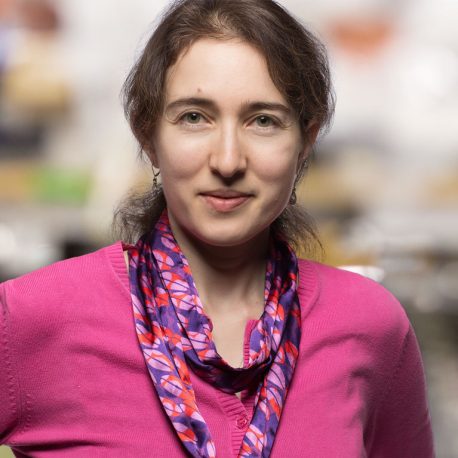
September 24, 2018
LA JOLLA—Salk Associate Professor Tatyana Sharpee, a member of the Computational Neurobiology Laboratory, has been elected a 2018 Fellow of the American Physical Society (APS) for her outstanding contribution to physics. In particular, she is granted this honor for “advancing our understanding of how neurons represent sensory signals and make decisions by pioneering new methods for analyzing neural responses to natural stimuli and uncovered organizing principles for closed loop behaviors,” according to the organization.

Click here for a high-resolution image.
Credit: Salk Institute
“Tanya’s work is a bridge connecting the domains of biology and physics,” says Salk President Rusty Gage. “It gives us unparalleled views of the natural world and helps us understand how physical laws guide the operation of biological systems in entirely new and interesting ways. We are delighted that her discoveries are being recognized with this prestigious honor.”
Sharpee’s work aims to develop a unifying theory of how biological systems process information. Specifically, she is uncovering how animals sense and adapt to their environment, as well as make predictions and decisions. To do this, she applies methods from physics, mathematics and information theory to chart the principles by which the brain’s billions of neurons exchange energy and information.
Among her discoveries are insights into how the brain’s visual system processes natural visual inputs, how different cell types divide work among themselves and how odors can be organized on a curved surface whose directions reveal properties like pleasantness or acidity.
Ultimately, Sharpee hopes that a unifying theory of biological control and information processing will provide guidance for innovative treatments and cures of biological disease and dysfunction, including those that occur in the brain.
The American Physical Society is a nonprofit membership organization working to advance and diffuse the knowledge of physics through its outstanding research journals, scientific meetings, and education, outreach, advocacy and international activities. APS includes over 55,000 members, including physicists in academia, national laboratories and industry in the United States and throughout the world. The number of APS Fellows elected each year is limited to no more than one half of one percent of the membership.
Office of Communications
Tel: (858) 453-4100
press@salk.edu
Unlocking the secrets of life itself is the driving force behind the Salk Institute. Our team of world-class, award-winning scientists pushes the boundaries of knowledge in areas such as neuroscience, cancer research, aging, immunobiology, plant biology, computational biology and more. Founded by Jonas Salk, developer of the first safe and effective polio vaccine, the Institute is an independent, nonprofit research organization and architectural landmark: small by choice, intimate by nature, and fearless in the face of any challenge.